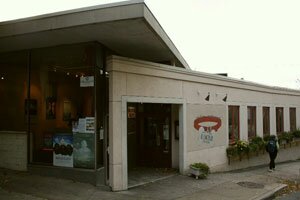Vinegar Hill: the long almost-goodbye

tasty vinegar
PHOTO BY JEN FARIELLO
"Vinegar Hill closing?"
I gasped, as I listened to the radio. The Hook had reported that the 32-year-old theater was closing after its participation in the Virginia Film Festival. Say it ain't so!
Okay– it isn't so. In an 11th-hour reprieve, the owner of the Visulite Cinemas in Staunton has made arrangements to take over the operation. It will close for improvements to the projection equipment and then reopen on November 14. Whew!
For those of us who know the history of the Vinegar Hill Theatre, this is just another chapter in a "David and Goliath" saga. For those of us who have spent many, many hours of enjoyment there, it's a relief.
In 1975, Ann Porotti and then-husband F. Guthrie "Chief" Gordon approached a former motorcycle dealership on Market Street. Their dream was to show the kind of films they loved— classic American and foreign— that weren't shown in Charlottesville.
They bought the whole building, sectioned off the front part that they needed and sold the garage part in the rear. An architect was hired, the building was transformed, and on Valentine's Day, 1976, it opened. For a small-town cinephile such as me, this was a dream come true.
Remember, this was pre-VCR/DVD; and cable television, still in its infancy, offered little. With the gigantic Paramount having just closed, and with the Jefferson busily reinventing itself as "The Cinema" (or "Skinema" due to its porno penchant), this new theater promised to be an oasis in a desert of dying downtown movie palaces.
For the next eight years, Vinegar Hill presented classic American movies and new foreign films shown in double features; a new pairing was offered three times weekly. They printed a monthly schedule that became so popular that it not only graced thousands of area refrigerators, but also had to be copyrighted to prevent other theaters from copying it outright. Unable to wait until it was delivered by mail, I would regularly stop by to get the newest line-up.
Despite criticism from some moviegoers accustomed to theaters with large screens and seating for over 500, such as the now-closed Barracks and University theaters, Vinegar Hill often sold out all its 219 seats because they offered a journey to films that just weren't available anywhere else locally.
I was able to see Bogart, Bacall, W.C. Fields, Bette Davis, James Dean, Chaplin, and others. While watching this parade of stars, I could enjoy fresh-popped corn (with real butter) and other treats from the most unconventional concession stand around.
I was slowly graduating from the mainstream classics, such as Casablanca and All About Eve, to lesser-known gems like Now, Voyager and The Mask of Dimitrios. I devoured them ravenously and was eager for more.
Then I opened up to (gasp) foreign films. I would begin to enjoy the pleasures of Ealing Studios, the French and Italian cinemas, and directors with names like Truffaut, Fellini, Bunell, Weir, and Wenders. I was sold.
Others weren't so thrilled. Moviegoers expecting mainstream fare on sprawling screens weren't always drawn to Vinegar Hill's smallish screen. And the idea of having to read subtitles of a foreign film while trying to watch it isn't everyone's idea of entertainment. Some people questioned the whole notion of paying to see films they might be able to catch on late-night television.
Other obstacles mounted. Decades ago, one downtown theater owner revamped his fare in a short-lived attempt to directly compete against Vinegar Hill. And in the Downtown Mall's pre-Ice Park era, many saw the district as a deteriorating wasteland.
In dealing with the last issue, Porotti and Gordon opened an Italian Restaurant named Fellini's nearby. Divorce followed soon after, leaving Porotti with the theater and Gordon with Fellini's.
As the movie industry changed during the late 1980s, classics and foreign films started getting priced out of range for such a small theater. Vinegar Hill rolled with the punches and thrived into the mid-1990s by focusing on independent and first-run foreign features.
Nationwide, a growing enthusiasm for indies attracted what would become another challenge: the 1996 arrival of the Regal Cinema Downtown Six Theater. Suddenly, tiny Vinegar Hill found itself competing for art films with the country's second-largest chain.
To compete for the latest films, the theater hired a New York film booker; and, to the chagrin of many fans, the calendar was dropped.
The following year, Porotti and her current husband, David Wyatt, built a small Italian restaurant– originally L'avventura and now called Il Cane Pazzo– on the front of the building.
That the Vinegar Hill Theater is still with us, 32 years later, is an interesting irony, as many large theater chains have gone bankrupt. Vinegar Hill is still vital, in part by meeting the demand for quality cinema in Charlottesville and also by becoming involved in the Virginia Film Festival and the Virginia Film Society.
Is Vinegar Hill Theater out of the woods? Hardly. New owner Adam Greenbaum will have to deal with Netflix and with dazzling home theaters whose screens rival Vinegar Hill's in size– not to mention this crisis-laden economic environment.
Currently, the independent film industry is in a downturn. If fewer indies get made, a new owner might be tempted to opt for the more commercial films. Will the arthouse theater go the way of mom-and-pop stores and neighborhood pharmacies?
The improbable dream of Vinegar Hill has survived this far. Can "David" continue to stand up to the continuing line of "Goliaths"?
Let's not only hope so, let's go to the movies. At Vinegar Hill Theatre, of course.
~
Local cinephile Carroll Trainum works the counter at BreadWorks and continually cements his position as a member of "The Red Sox Nation" by repeating the phase: "Wait until next year!"
#